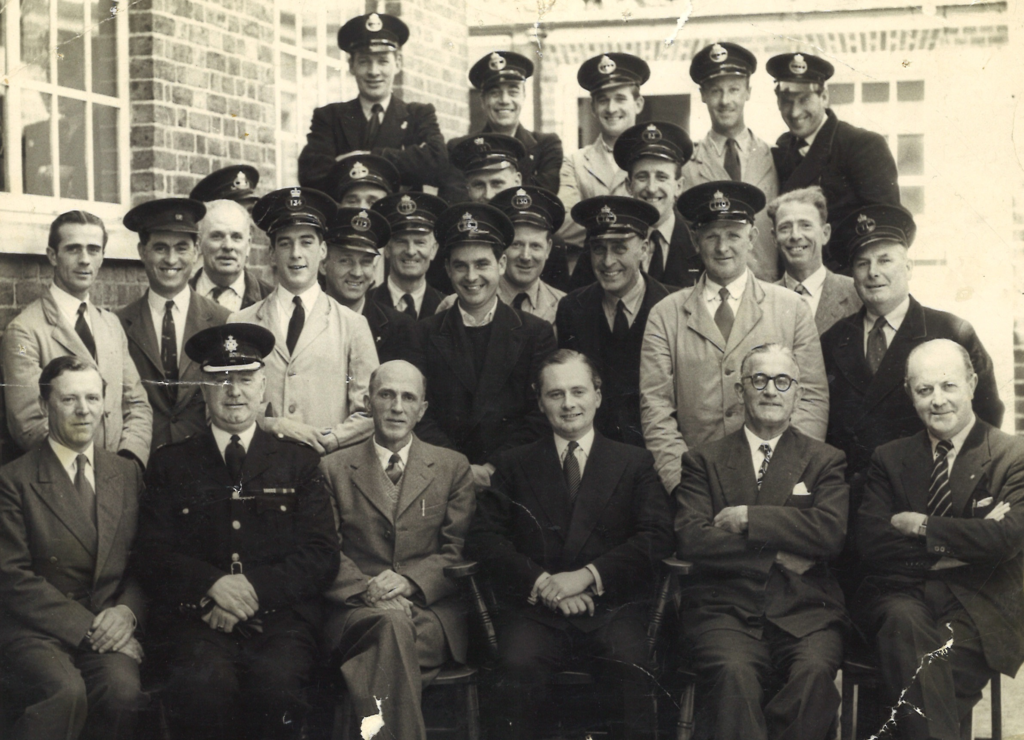
Uckfield Post Office, 1955
Harry Tomsett, second row, centre
But little do men perceive what solitude is, and how far it extendeth. For a crowd is not company; and faces are but a gallery of pictures; and talk but a tinkling cymbal, where there is no love.
Francis Bacon
A research study undertaken by the University of Chicago on the impact of loneliness upon our overall health presented some staggering findings. Compared with the average person in the study, those who reported being lonely had a 14% greater risk of dying. The figure means that loneliness has around twice the impact on an early death as obesity.
As we live longer, get married later, change jobs more frequently, travel further away from our birthplaces and work endlessly, loneliness is becoming one of our greatest public health concerns.
Loneliness gets in your brain and your bones. In January 2016 the BBC screened a programme entitled The Age of Loneliness. In a poignant documentary, which is affecting yet never mawkish, Sue Bourne interviews a range of people who talk about living in relative solitude. Loneliness, according to Bourne, is ‘the silent epidemic’.
The programme features many elderly people, including Olive who was born 100 years ago, when the life expectancy of women was 55; now it’s 83. For women more than men, those last years of life, which can be accumulate into decades, are spent alone. Bob, who is in his nineties, sits all evening in his front room; in a chair next to him is perched an urn containing his wife’s ashes.
And, of course, loneliness isn’t limited to the aged. One interviewee, Isobel, was a university undergraduate. She explained how lonely her existence had been as a fresher. She was ‘very taken aback by loneliness’ when she arrived at university. ‘I’ve literally stayed in my room for three days…it felt like a prison…and the silence makes you feel a bit funny, so I locked the door.’ Bourne says that the young are now as vulnerable to the corrosive effects of loneliness as the elderly. The most connected generation are, in some ways, the most isolated. Wedded to their telephones and tablets, they share on-line a glossy veneer version of the best bits of their lives from the solitude of their empty bedrooms.
Bourne’s fundamental conclusion is that, ‘People of all ages missed someone to do nothing with. To chat idly. To sit next to.’ And that’s it, isn’t it? We all need, to a greater or lesser extent, someone with whom to share our lives. Endless afternoons spent doing not-a-lot are completely bearable if you’re doing not-a-lot with someone else.
Which brings me to Post- men and women. My dad left school at 14 to become a messenger boy, the prelude to becoming a lifelong postman. He suffered his first heart attack aged 39. Dad’s angina meant he was given his own post van and a single round through the country lanes south of Uckfield in deepest East Sussex. It took the pressure off him walking and having to carry a heavy bag of post.
And what it afforded him was the chance to forge strong, life-enriching relationships with the men and women to whom he delivered letters.
Dad’s round incorporated Framfield where my sister Heather now lives. Before she moved into her house it was owned by an old man, and dad used to deliver his letters. After the old man died and his daughter had sold Heather the house, she took my sister by the hand and led her out to the back garden.
There, at the far end of the lawn, a hole had been dug in the ground, remarkably similar in size to a golf hole. Apparently, dad would, on occasion, stop at the old man’s house for a cup of tea and had taught him how to putt.
The home-made hole in the lawn was just one of the many legacies dad left the people he greeted daily with their letters. When he died mother did not feel able to give dad’s Jack Russell dog, Jilly, the daily walks she needed. We gave Jilly to a couple who ran a farm on dad’s round.
One of his friendships from which I benefitted directly was with Norman and Guy, the two housekeepers at Arches Manor. Hugh Vaughan-Thomas, Glamorgan cricketer and brother of the BBC radio presenter Wynford, owned Arches but was rarely there. Norman and Guy loved my dad and allowed me to fish the manor’s carp pool whilst the three of them drank wine and danced to Dolly Parton singing ‘Stand By Your Man’.
So, why am I recounting these Royal Mail tales of yesteryear now? Well, currently postal workers are involved in industrial action. Whilst there are always two sides to every story, one of the key issues of conflict between workers and the employer is the latter’s plans to move all workers onto zero-hour contracts, gig-economy style.
Whilst contractual changes may minimise costs, they would also fundamentally change the nature of delivering letters. It would rob communities of one of life’s staples, the daily contact with your postal worker’s familiar face.
Of course things change. But at a time when, according to the ONS, chronic loneliness has increased by 25 per cent since the pandemic, losing the kind of social interaction my postman dad provided and enjoyed may just be a loss too far for many lonely people.
